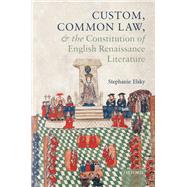Custom, Common Law, and the Constitution of English Renaissance Literature argues that, ironically, custom was a supremely generative literary force for a range of Renaissance writers. Custom took on so much power because of its virtual synonymity with English common law, the increasingly dominant legal system that was also foundational to England's constitutionalist politics. The strange temporality assigned to legal custom, that is, its purported existence since 'time immemorial', furnished it with a unique and paradoxical capacity--to make new and foreign forms familiar. This volume shows that during a time when novelty was suspect, even insurrectionary, appeals to the widespread understanding of custom as a legal concept justified a startling array of fictive experiments.
This is the first book to reveal fully the relationship between Renaissance literature and legal custom. It shows how writers were able to reimagine moments of historical and cultural rupture as continuity by appealing to the powerful belief that English legal custom persisted in the face of conquests by foreign powers. Custom, Common Law, and the Constitution of English Renaissance Literature thus challenges scholarly narratives in which Renaissance art breaks with a past it looks back upon longingly and instead argues that the period viewed its literature as imbued with the aura of the past. In this way, through experiments in rhetoric and form, literature unfolds the processes whereby custom gains its formidable and flexible political power. Custom, a key concept of legal and constitutionalist thought, shaped sixteenth-century literature, while this literature, in turn, transformed custom into an evocative mythopoetic.








